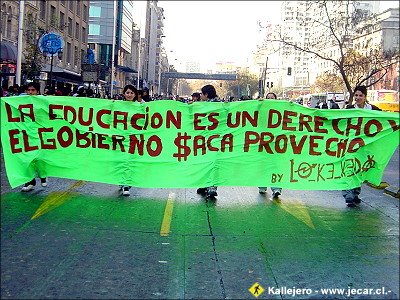
Picture Kallejero: To view more from Kallejero visit the complete gallery
After a long silence due to work, I have returned to post stories on and about Chile. I hope they provide an outlook about Chile.
For a chronology of events read the previous post
In April, public school high school students took to the streets in efforts to have their demands heard by the new Michelle Bachelet government. High school students demanded that the Government take their five points demands seriously.
Minister of Education Martin Zilic, just a month into his post, did not seriously gauge the students’ demands, as Ministry officials failed to properly advised the incoming authorities. The Bachelet government took office on March 11, and it was four weeks into their mandate that students took to the streets.
Students’ took to the streets with five-point demands:
• Free bus pass
• Free bus fare
• A waiver of the University entrance exam fee
• Review of the School program, particularly the hours they have to spend in the classroom
• Repeal the Education Act. The Education Act is a constitutional rank law that calls for the freedom of education. Students demand the repeal of the Education Act and replaced with a new Act that guarantees the right to an education.
This last point is rather controversial as the Education Act was passed by the Augusto Pinochet dictatorship in eve of the hand over to democratic rule, March 11, 1990. The Education Act guarantees something called the freedom of education, which in reality is a euphemism to guarantee the right to private education and for the State to play a subordinate role in education. In other words, an ideological tool that lets the market regulate the educational system.
The Education Act (known by its initials as LOCE) also entrenched the so-called “municipalization” of the public educational system. This meant Municipal governments had to take over the administration of all public schools in their jurisdiction, hire schoolteachers and officials, and manage the schools within their jurisdiction. However, municipalities were not given the financing to properly administer their schools. It is up to the Ministry of Education to finance the schooling of each student in the public system, but they are not supposed to pay for infrastructure, all monies have to be invested by law in the classroom, in other words the student.
According to the Education Act, it allows for three independent educational systems.
The traditional public system administer by municipalities that do not have the capacity to administer their schools. The Ministry of Education pays CL$ 30,000 (some US$ 55.00) pesos monthly for each child in the classroom.
Then is the so-called private/public partnership, where a private individual with a school program gets a license to operate a private school that receives partial funding from the State to administer the private school.
And lastly the private school system, that operates like anywhere else in the world. Parents pay tuition for the privilege of a private exclusive educational system.
The Ministry of Education’s school curriculum is only used in the public system, while in the private/public partnerships; school owners may use some parts of the curriculum and implement their own programs. In the private system they have their own independent educational model.
The students’ mobilization forced the Government and legislators look at the Education Act, this past Wednesday, President Bachelet created an Educational Commission that will prepare the groundwork for a new education legislation. But the right-wing UDI opposition says the freedom of education entrenched as a right in the legislation will not be changed.
On Wednesday when President Bachelet introduced the Commission, she told the press that the freedom of education will not be touched, but it will yield to the right to an education.
